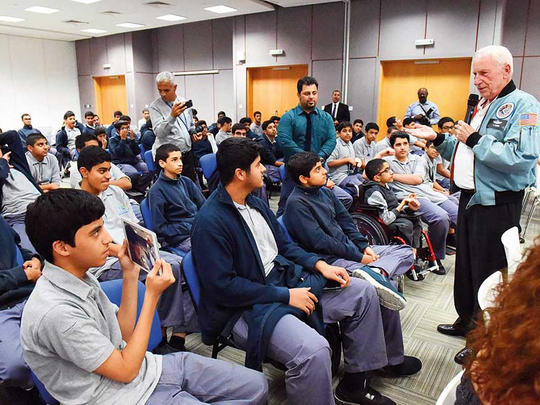
Abu Dhabi: The UAE’s plans to send a probe and build the first ever city on Mars were hailed by a former astronaut who went to the moon in 1971 as part of the Apollo 15 mission.
Colonel (retired) Alfred Worden, United States Air Force, made the remarks during a presentation he delivered for young students at Abu Dhabi’s Applied Technology High School. Worden worked as the command module pilot for the Apollo 15 mission, the fourth lunar landing mission.
“Forty-six years ago I went to the moon. I am actually one of a very small group of people that went to the moon in the late 1960s and early 70s based on the science and technology that was developed [back then] that gave us the capability of going to the moon and coming back,” he said.
Col Alfred Worden with Dr Abdul Rahman Al Hammadi, managing director of Abu Dhabi Vocational Education and Training Institute. (Photo: Abdul Rahman/Gulf News)
“We had an economical way of landing a man on the moon … we used the lunar orbit [method], so I had to take the lunar module all the way to the moon, go into orbit around the moon, drop the astronauts off, and then when they were done I collected them and brought everybody back home,” he added, explaining the role he played on Apollo 15.
Worden said that the next step in human space exploration should be focused on sending humans to Mars, and not only for scientific purposes, but to make the red planet our future home.
“His Highness Shaikh Mohammad Bin Rashid Al Maktoum, Vice-President and Prime Minister of the UAE and Ruler of Dubai, said your country is going to send a hope probe around Mars in 2020 and going to build a city in Mars in 100 years, that is pretty visionary,” he said.
“The whole world watched when Neil Armstrong was the first guy to walk on the moon … and I think today we are going full circle with what we did 40 years ago, because now we are looking at Mars … I think that’s critical for all of us, for your country and mine,” he added.
- Col (Retd) Alfred Worden | Member of Apollo 15 mission
“I believe the future of our human species depends on us building machines that are going to take us someplace where we can live after we can’t live here [on earth] anymore,” he said.
Worden said the success of future space exploration would rely on getting young students involved with science, technology, engineering and maths (STEM) programmes.
“Technology provides the tool we use to make progress and advance ... Engineering is how we solve the problems using the application of science and technology,” he said.
“Maths is kind of the roadwork … whether you are flying far or drilling deep … maths provides that roadway, once you know where you want to go then you can engineer a solution,” he added, explaining how STEM complements the work of space exploration.
Worden said he was confident that humans would go to Mars, putting it down to the human spirit of exploration.
“Man is a natural explorer, our human species asks a lot of questions about a lot of stuff because we can’t just help it.”












